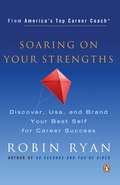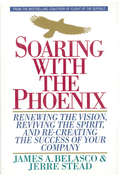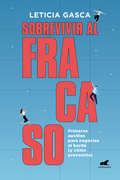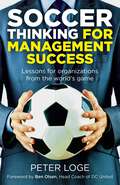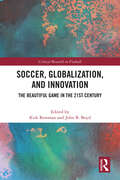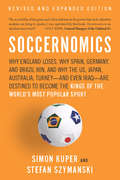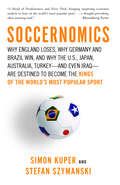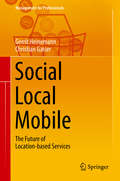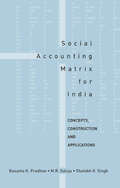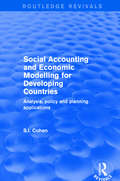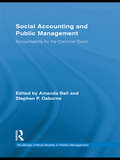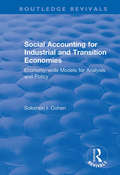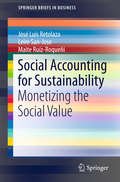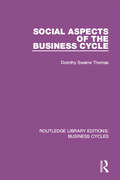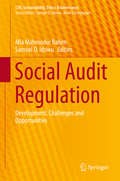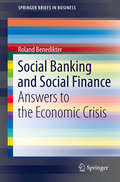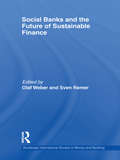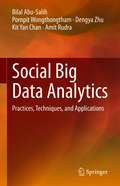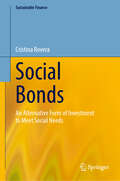- Table View
- List View
Soar!: Build Your Vision from the Ground Up
by T. D. JakesYou don't have to be an entrepreneur to think like one and take flight with your dreams. Too often we remain in jobs that stifle our souls and leave us on the runway of opportunity with the engine of our deepest passion stalled, watching others make their personal vision a reality and build a legacy for their children-the opposite of what God intends for us. But it's never too late to get your dreams off the ground! If you long to maximize your unique abilities and aptitudes, if you strive to combine personal fulfillment with professional satisfaction, if you dream of creating exceptional goods and offering transformative services and fulfilling God's destiny for you, then you are ready to SOAR! In SOAR! T.D. Jakes reveals how to build the uniquely personal vision within each of us into our special contribution to the world. Blending the practical business acumen of a successful, global CEO with the dynamic inspiration of a life coach, SOAR! provides the tools needed to ignite our imaginations into action and challenges us to embrace our God-given purpose as we align our character and creativity with our careers. Bridging both the corporate and nonprofit worlds, SOAR! is a practical and easy-to-follow flight plan for launching the entrepreneurial drive inside each of us. It provides an inspiring look into the mindset of people who don't wait to see what will happen but strategically build the wings that will take them to new heights. So buckle your seat belts and prepare for liftoff-you have been cleared to fly beyond your fears, to absolutely SOAR!
Soaring on your Strengths
by Robin RyanRobin Ryan’s groundbreaking new book is designed to help readers take advantage of a paradigm shift in the workplace. Instead of hiring or promoting generally qualified people and improving their weaknesses, companies are now looking for workers who have the strengths that match particular jobs. Ryan shows readers how to identify those strengths and use that knowledge to advance their careers and better promote themselves to prospective employers. She shows how to establish an appealing career identity using self-branding tools like résumés, Mind Maps, and on-the-job success stories, and outlines fresh approaches to networking with colleagues and negotiating with bosses. Savvy and entertaining, Soaring on Your Strengths will be the job and promotion seekers guide for the twenty-first century. In Soaring on Your Strengths, Ryan shows you how to: identify your most marketable qualities and strengths self-promote and brand yourself for the best jobs and promotions. establish an appealing career identity implement fresh approaches to networking with colleagues improve your relationship with the boss Filled with her client success stories, solid strategies, and smart, easy-to-follow advice, this book is the next best thing to having your own career coach on-call to advance your career and prosper. .
Soaring with the Phoenix: Renewing the Vision, Reviving the Spirit, and Re-Creating the Success of your Company
by James A. Belasco Jerre SteadLike the mythical Phoenix, organizations must first die in order to be more effectively reborn. Rather than wasting efforts on changing current cultures, this book lays out a proven, systematic methodology which is customer focused, knowledge based, and accountability driven.
Sobha Group Real Estate: Backward Integration for Quality
by John D. Macomber Alpana ThaparFrom humble beginnings in Kerala, India, Mr. PNC Menon built a reputation for quality, detail, and trustworthiness, earning him major construction commissions in the Gulf region. This paved the way for venturing into real estate development in Dubai, UAE. Striving to control quality and schedule, his firm, Sobha Middle East, self-performs a wide range of tasks - an unusual set of choices in the global real estate and construction industry. In mid-2018, the 70 year old entrepreneur and his team are contemplating their longer term strategy, particularly regarding land acquisition, construction strategy, and financing. Is the backward integration model replicable and sustainable? Meanwhile, sitting in Bangalore, PNC Menon's son Ravi Menon, Chairman of publicly listed Sobha India, is facing a typical in-house versus outsource decision. Sobha India had pioneered the backward integration strategy prior to Dubai. Ravi Menon and his team are deciding on the structural system for Sobha Bellahalli complex of 5,000 apartments in Bangalore. Should they deploy a cast in place structural frame or invest in a precast concrete manufacturing plant on site? Additionally, should they purchase local ready-mix concrete or invest in their own mixing and batching plant? The cost and schedule implications will influence bidding strategy in an upcoming land joint venture. Father and son, on both sides of the continent, have a lot to think about.
Sobrevivir al fracaso: Primeros auxilios para negocios al borde (y cómo prevenirlo) (Negocios Rentables E Innovadores Ser.)
by Leticia Gasca SerranoEn 2012, Leticia Gasca junto a cuatro amigos creó Fuckup Nights donde se comparten historias de fracasos empresariales. Este libro tiene la intención de compartir el conocimiento que existe en torno a cómo prevenir el fracaso y combatirlo, pero también aquel que se relaciona con aceptarlo y cerrarlo con todas las de la ley para recuperarse y seguir adelante. "El fracaso de un negocio apesta, provoca dolores de cabeza, corazón y billetera. Sin embargo, se trata de una de las experiencias humanas más comunes y menos exploradas." Con estas palabras presenta su libro Leticia Gasca, cofundadora de Fuckup Nights y directora del Failure Institute, el único instituto en el mundo dedicado al estudio del fracaso en los negocios, y nos sorprende al revelarnos algunos datos que suelen quedar fuera de las estadísticas: el 95% de los productos que se lanzan al mercado fracasan y el 80% de los negocios que se emprenden cierran antes de cumplir los dos años. Es decir que solo el 20% es exitoso, y es de esta minoría que se nutren las teorías sobre empresas exitosas enseñadas en las escuelas de negocios de todo el mundo. ¿Por qué ocurre esto? Porque en general solemos tomar al fracaso como un tabú, una experiencia que es mejor ocultar porque atentaría contra una creencia colectiva que tiende a relacionar el parecer exitoso con el serlo realmente. Este es el espacio sobre el que se propone echar luz la autora de estas páginas: el conformado por aquellas historias ocultas, por lo que no pudo ser, por los emprendedores que fracasaron, los resilientes y los resignados. Y a la vez, y como consecuencia, ilumina también el costado no hegemónico del planeta: el de Latinoamérica y el conjunto de los países que no forman parte del primer mundo. Allí la realidad acerca del éxito empresarial es otra. De todo esto trata este libro. De hacer visible un tema hasta ahora poco explorado, quizás avalado en la idea equívoca de que negar es una condición suficiente para hacer desaparecer. Muy por el contrario, es aceptando la presencia contundente del fracaso que podemos comenzar a combatirlo y, por qué no, a incluirlo como parte absolutamente natural e inherente a la vida de todo ser humano. En palabras de su propia autora: «Estas páginas tienen la intención de compartir el conocimiento que existe en torno a cómo prevenir el fracaso en un negocio y combatirlo, pero también aquel que se relaciona con aceptarlo y cerrarlo con todas las de la ley para recuperarse y seguir adelante».
Soccer Thinking for Management Success: Lessons for Organizations from the World's Game
by Peter LogeThe modern world is networked and always working. Organizations no longer have the luxury of time. Expertise is no longer confined to a couple of smart guys in corner offices, reviewing information to which only they have access and issuing instructions through layers of middle-men to nine-to-fivers who carry out the dictates and feed paper back up the chain, awaiting the next set of instructions. Today&’s successful organization is decentralized and never stops moving. In fact, organizational success is a lot like soccer. Every player is both a specialist and generalist. Responsibility on the field is distributed, and everyone on the team works for everyone else. Communication among players is constant. Soccer is 90 minutes of systems thinking in action. Soccer Thinking for Management Success is by a soccer fan and player who has spent a career building and running teams and organizations. He draws on insights from leaders, known and not-so-well-known who use soccer thinking to succeed. This is not just another book on how to be a great leader by a famous person. This is a management and leadership book by, and for, the rest of us.
Soccer, Globalization, and Innovation: The Beautiful Game in the 21st Century (Critical Research in Football)
by Kirk Bowman John B. BoydThis is the first book to focus on innovation as a response to globalization in soccer in the context of the global development of the world’s most popular sport.Concentrating on social innovation and on innovations in governance and organization in soccer’s traditional heartlands and also at its global periphery, the book explores some of the most important contemporary themes in the social scientific study of sport, including fandom, activism, gender, governance, new media, artificial intelligence, greenwashing, and sport-for-development. The book features case studies from around the world, including the United States, Brazil, Türkiye, Finland, England, Spain, Japan, Morocco, Uruguay, and South Africa, and it opens new theoretical perspectives on soccer as a vector of social development and on the intersection of sport and globalization.This is fascinating reading for anyone with an interest in the sociology of sport, sport management, sport development, soccer, political science, or global development.
Soccernomics
by Simon Kuper Stefan SzymanskiWhy do England lose? Why does Scotland suck? Why doesn’t America dominate the sport internationally. . . and why do the Germans play with such an efficient but robotic style? These are questions every soccer aficionado has asked. Soccernomicsanswers them. Using insights and analogies from economics, statistics, psychology, and business to cast a new and entertaining light on how the game works,Soccernomicsreveals the often surprisingly counterintuitive truths about soccer. An essential guide for the 2010 World Cup,Soccernomicsis a new way of looking at the world’s most popular game.
Soccernomics
by Simon Kuper Stefan SzymanskiWhy do England lose? Why does Scotland suck? Why doesn't America dominate the sport internationally...and why do the Germans play with such an efficient but robotic style?These are questions every soccer aficionado has asked. Soccernomics answers them.Using insights and analogies from economics, statistics, psychology, and business to cast a new and entertaining light on how the game works, Soccernomics reveals the often surprisingly counterintuitive truths about soccer. An essential guide for the 2010 World Cup, Soccernomics is a new way of looking at the world's most popular game.
Soccernomics: Why England Loses, Why Spain, Germany, and Brazil Win, and Why the U.S., Japan, Australia—and Even Iraq—Are Destined to Become the Kings of the World’s Most Popular Sport
by Simon Kuper Stefan SzymanskiSoccernomics pioneers a new way of looking at soccer through meticulous, empirical analysis and incisive, witty commentary. The San Francisco Chronicle describes it as “the most intelligent book ever written about soccer.” This World Cup edition features new material, including a provocative examination of how soccer clubs might actually start making profits, why that’s undesirable, and how soccer’s never had it so good.
Social - Local - Mobile
by Gerrit Heinemann Christian Gaisern the future, shopping will be greatly influenced by a combination of localization issues, mobile internet at the point of sale, and use of social networks. This book focuses on the 'SoLoMo synergies' that arise from this paradigm shift in future shopping, which also promises new and effective marketing options for traditional retailers. It also reflects the current status of research and business practice, analyzing the basic factors of SoLoMo in detail. The importance of Location-based Services (LBS) is elaborated and analyzed in an empirical study using a market based case of kaufDA - a leading German online shopping network. The evidence shows that customers see LBS as an attractive tool and are prepared to change their buying behavior. Though LBS is still in its early stages and its professional longevity remains to be seen, it also promises tremendous potential for the future.
Social Accounting Matrix for India: Concepts, Construction and Applications
by Basanta K Pradhan M R Saluja Shalabh K SinghA new social accounting matrix (SAM) for the Indian economy is presented in this book. It addresses the need for an up-to-date and detailed SAM for India which classifies household incomes by sources of income from different occupations. It distinguishes 60 sectors of production and six categories of occupational households separately for rural and urban areas.
Social Accounting Systems
by Louis FillerSocial accounting grew up as a result of the desire to bring together in a meaningful and comprehensive manner all the available observed facts on the economic and financial activity of a nation. Three social accounting systems of flow have been developed during the last three decades. Each of these systems has been constructed separately and independently. The framework of each system is constructed to tackle specific aspects of the national economy. It is also designed in a manner, which helps in framing policies for future activity. The aim of this book is mainly to describe the anatomy of these three social accounting systems and compare their structures. Some attention is also given to a comparison of the systems in actual use by some industrially developed countries, including the centralized economies. The problem of integrating the three systems is also cursorily treated. The student of economics, and the economist in the service of industry, private or public, will obtain from this book a picture of the concepts and: definitions used in social accounting; the book also describes how each system is constructed, and which economic study or analysis it can best serve. Another valuable feature is the comparison the author makes of the national accounts system with the Russian "Natsional'ny Dokhod." In this far-reaching and complex work, the author has brought together the fruits of his very extensive studies into the social accounting methods of many nations, and he goes beyond the analysis of existing systems to suggest ways of tackling the problems of integrating the three main systems into one. Dr. Yanovsky is at present senior economist in the State Comptroller's Office in Israel. He studied economics in the Universities of Chicago and Manchester (where he obtained his doctorate at the Department of Economics and Social Studies in 1963). It was from a thesis he wrote while in Manchester that he drew the inspiration, and much of the material, for
Social Accounting and Economic Modelling for Developing Countries: Analysis, Policy and Planning Applications (Routledge Revivals Ser.)
by S.I. CohenThis title was first published in 2002. Providing the first comprehensive systematic assessment of the social accounting matrix (SAM) in twenty developing countries, Solomon Cohen introduces key research in the area and looks at its practical applications. Divided into two parts, the first part of each chapter: -Deals with the construction and structural analysis of the SAM -Examines refinements of the SAM as a self-contained model of the economy; study of SAM multipliers of growth and distribution -Explores decompositions of multiplier effects and cross-country and inter-temporal comparative analysis of changing economic structures. The second part looks at the SAM as a modular framework and a database, which can be flexibly used in economic policy modelling. This valuable reference, and the accompanying volume Social Accounting or Industrial and Transition Economies will be an essential addition to the bookshelves of researchers, instructors, policy makers, scholars and libraries.
Social Accounting and Public Management: Accountability for the Public Good (Routledge Critical Studies in Public Management)
by Amanda BallSocial accounting as a discipline has challenged the methodology and focus of the larger field of accounting over the last 50 years. More recently it has taken on greater significance for other subjects as well, addressing issues for public policy and management more broadly. These include the issues of the nature of accountability in the contemporary plural state, environmental and societal sustainability, the ethical management and governance of public services and resources, and the creation and sustenance of social capital as an essential element of the modern plural state. Social Accounting and Public Management brings together for the first time researchers from a range of disciplines including accounting, political science, management, sociology and policy studies to discuss and develop our knowledge and theory of the nature of ‘accountability’ in contemporary global society and the challenges it may pose for public policy and management. This book addresses this nexus of all of these issues and disciplines, and through this, makes a contribution to the development of the disciplines of both social accounting and public policy and management.
Social Accounting for Industrial and Transition Economies (Routledge Revivals)
by Solomon CohenThis title was first published in 2002: Showing how the social accounting matrix provides a comprehensive framework for the analysis and tabulation of national statistics and how it can assist in developing economic policy, this work also demonstrates the key aspects of this approach in dealing with a wide range of economic and social issues. The reference, and the accompanying volume, "Social Accounting and Economic Modelling for Developing Countries" should be useful for researchers, instructors, policy makers and scholars.
Social Accounting for Sustainability
by José Luis Retolaza Leire San-Jose Maite Ruíz-RoqueñiThis book deals with the limitations of economic and financial accounting as an appropriate instrument to reflect the real value created or destroyed by an organization. The authors present a sustainable social accounting approach that considers both the social and economic value - Blended Value - generated by an organization for all of its stakeholders. This approach is based on four major theories - Stakeholder Theory, Action Research, Phenomenological Perspective and Fuzzy Logic - and was developed on the basis of a cost-benefit analysis.
Social Aspects of the Business Cycle (Routledge Library Editions: Business Cycles)
by Dorothy Swaine ThomasUsing statistical analysis, this volume, originally published in 1925, examines the sociological aspects of the business cycle. It discusses which areas of social activity are influenced by the business cycle and measures the relative degree of this influence in each of the areas which are covered. Bringing together the work of economists and criminologists, this volume discusses topics such as births, deaths, poverty, crime, emigration and marriage in relation to business cycles.
Social Audit Regulation
by Samuel O. Idowu Mia Mahmudur RahimThis book takes the concept of social audit and lifts it beyond the role of functioning largely as a management tool. The book proposes a system in which social audit is regulated so as to provide a mechanism for effectively promoting corporate accountability in society. Taking this as its theme, this book provides both a conceptual explanation of the developmental perspectives of social audit regulation and empirical evidence of the impact of social audit practice from different parts of the world. It is the first book to explore the issues and challenges related to the development of effective social audit regulation.
Social Banking and Social Finance
by Roland BenedikterFor over 2,000 years, banks have served to facilitate the exchange of money and to provide a variety of economic and financial services. During the most recent financial collapse and subsequent recession, beginning in 2008, banks have been vilified as perpetrators of the crisis, the public distrust compounded by massive public bailouts. Nevertheless, another form of banking has also emerged, with a focus on promoting economic sustainability, investing in community, providing opportunity for the disadvantaged, and supporting social, environmental, and ethical agendas. Social Banking and Social Finance traces the emergence of the "bank with a conscience" and proposes a new approach to banking in the wake of the economic crisis. Featuring innovations and initiatives in banking from Europe, Canada, and the United States, Roland Benedikter presents an alternative to traditional banking practices that are focused exclusively on profit maximization. He argues that social banking is not about changing the system, but about improving some of its core features by putting into use the "triple bottom line" principle of profit-people-planet. Important lessons can be learned by the success of social banks that may be useful for the greater task of improving the global financial system and avoiding economic crises in the future.
Social Banks and the Future of Sustainable Finance (Routledge International Studies In Money And Banking Ser. #64)
by Olaf Weber Sven RemerSocial Banking describes a way of value-driven banking that has a positive social and ecological impact at its heart, as well as its own economic sustainability. Although it has a long and successful history, it has arguably never been more topical than it is now in the aftermath of the latest financial crisis. Most Social Banks came out of this crisis not only unscathed but much stronger and bigger than they were before. And contrary to their conventional peers, none of the Social Banks had to be bailed out with public funds. This increasingly attracts the interest not only of clients searching for safe and sensible ways to deposit their funds but also of conventional banks that begin to understand the potential of a more socially oriented approach towards banking. Social Banks and the Future of Sustainable Finance is the first book to deliver a comprehensive and detailed overview about the past, present and possible future of Social and Sustainable Banking for researchers, students and a professional audience. The authors are experts from research and practice and have bee involved in Social Banking for many years. Thus they combine state-of-the-art expertise with valuable insider knowledge. The book covers the following topics: the history of Social Banking, the need for Social Banking in the current economy, the particular issues of managing a Social Bank as business enterprise, Social Banking products and services, the special role of donations and foundations for financing change, the opportunities and challenges for Social Banks lying ahead, and concrete directions for the future of Social Banking. In addition to these respective analyses are many real-world examples and interviews with representatives of Social Banks. As such, this comprehensive collection delivers valuable insights for academics, students and professionals who are interested in the growing field of Social Banking.
Social Big Data Analytics: Practices, Techniques, and Applications
by Pornpit Wongthongtham Bilal Abu-Salih Dengya Zhu Kit Yan Chan Amit RudraThis book focuses on data and how modern business firms use social data, specifically Online Social Networks (OSNs) incorporated as part of the infrastructure for a number of emerging applications such as personalized recommendation systems, opinion analysis, expertise retrieval, and computational advertising. This book identifies how in such applications, social data offers a plethora of benefits to enhance the decision making process.This book highlights that business intelligence applications are more focused on structured data; however, in order to understand and analyse the social big data, there is a need to aggregate data from various sources and to present it in a plausible format. Big Social Data (BSD) exhibit all the typical properties of big data: wide physical distribution, diversity of formats, non-standard data models, independently-managed and heterogeneous semantics but even further valuable with marketing opportunities.The book provides a review of the current state-of-the-art approaches for big social data analytics as well as to present dissimilar methods to infer value from social data. The book further examines several areas of research that benefits from the propagation of the social data. In particular, the book presents various technical approaches that produce data analytics capable of handling big data features and effective in filtering out unsolicited data and inferring a value. These approaches comprise advanced technical solutions able to capture huge amounts of generated data, scrutinise the collected data to eliminate unwanted data, measure the quality of the inferred data, and transform the amended data for further data analysis. Furthermore, the book presents solutions to derive knowledge and sentiments from BSD and to provide social data classification and prediction. The approaches in this book also incorporate several technologies such as semantic discovery, sentiment analysis, affective computing and machine learning.This book has additional special feature enriched with numerous illustrations such as tables, graphs and charts incorporating advanced visualisation tools in accessible an attractive display.
Social Bonds: An Alternative Form of Investment to Meet Social Needs (Sustainable Finance)
by Cristina RoveraCan finance help mankind? We are accustomed to reading sad news about money. Apparently, money is often associated exclusively with illicit trafficking, and it seems that only the wicked benefit from it, while good people are crushed by a system that exploits them. Is this true? Is this the reality of our world? Perhaps money is merely a tool. What truly matters is the intention behind its use. Consider the positive impact that can be achieved through charitable acts. This book introduces and discusses the concept of social bonds as instruments created to enhance collective welfare. Nevertheless, the characteristics of social bonds allow for individual well-being as well. Social bonds can yield a return and ensure repayment of the principal upon maturity. They can be perceived as an alternative to donations for those who support them or as a means of diversification for those interested in personal gain. The ultimate purpose of the investment holds little significance. What truly matters is the allocation of resources towards ethical endeavors. Currently, social bonds constitute a niche market, yet they harbor significant potential for development. This book proposes a global examination of the subject matter. The analysis delves into the social reality implemented worldwide, focusing on economic aspects such as risk and return, fundraising, successes, and failures. Additionally, the author explores the advantages and disadvantages of these instruments to provide a comprehensive study of the sector.
Social Brand Management in a Post Covid-19 Era (Routledge Focus on Business and Management)
by Patrícia Dias Alexandre DuarteAs activity significantly reduced during mandatory lockdown periods aiming to contain the spread of Covid-19, the relationship between organizations and their stakeholders became almost strictly digital. While some brands already have developed digital channels and made a smooth transition, others struggled to remain connected to their consumers and in the process created a panoply of new digital strategies and practices. This book discusses how the Covid-19 pandemic changed the way consumers relate with brands and how brands can reinvent, improve, or optimize themselves to meet new needs, expectations, and preferences of consumers. Drawing on empirical data about how consumers are connecting with brands in a Covid-19 recovery period, this book suggests becoming a social brand as a strategy for coping with changes in consumer behaviour. A social brand has two main dimensions: it is sociable (active on social media, humanized, and empathic) and it is socially committed (transparent and sustainable). In this concise book, the authors examine case studies of brands that coped successfully with Covid-19 and positioned themselves strongly in this post-pandemic retake period to suggest good practices. It offers an informed discussion on how brands can adapt to changes in consumer behaviour and build stronger connections with consumers. Social Brand Management in a Post Covid-19 Era provides an accessible yet comprehensive overview of brand management in a post-pandemic environment that will be of interest to marketing and communication academics, researchers, and students.
Social Branding
by Andreas Horx Artur Mertens Matthias SchultenRund 40 Prozent der Unternehmen sind mittlerweile in sozialen Medien aktiv. Die meisten von ihnen, um die eigene Marke zu profilieren und die Markenloyalität ihrer Kunden zu steigern, kurz: um Social Branding zu betreiben. Mit dem Social Branding geht eine Veränderung der Markenkommunikation einher. Waren Unternehmen bislang nur Sender von Markenbotschaften, so empfangen sie nun auch Botschaften ihrer Kunden. Diese sind nicht nur für das Unternehmen sichtbar, sondern auch für andere Kunden. Damit nehmen Kunden aktiv Einfluss auf das Markenimage, weshalb sich die Markenführung mit einer Reihe neuer Fragen befassen muss: * Wie kann die Community sinnvoll in die eigene Markenführung eingebunden werden? * Wie können Social-Branding-Kampagnen entwickelt, lanciert und überwacht werden? * Welche Kompetenzen sind für das Social Branding erforderlich? * Welche rechtlichen Rahmenbedingungen sind zu berücksichtigen? * Was sind Erfolgsfaktoren im Social Branding? Das Buch "Social Branding" liefert aktuelle Impulse für die Markenführung in sozialen Medien. Es enthält Beiträge renommierter Hochschulen und bekannter Unternehmen, wie zum Beispiel 1&1, Deloitte, Harley-Davidson, MasterCard, Nestlé, Scout24, Telekom, VZ Netzwerke, Warsteiner und XING sowie ein Interview mit Audi, Dell und Swiss International Air Lines.

